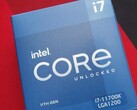Over the past several weeks, we've seen Intel Rocket Lake-S show up in numerous leaks. While the first impressions gained from early reviews and benchmark leaks can potentially raise an eyebrow or two, Rocket Lake-S is currently Intel's best shot against a resurgent AMD that has finally managed to crush Team Blue's hegemony in single-thread performance and gaming.
Today, Intel is finally taking wraps off the 11th gen Rocket Lake-S lineup. There aren't too many surprises here from what we've already seen so far, but here's the full scoop from Intel on platform features, SKUs, and pricing.
With Rocket Lake-S, Intel's focus is not to compete with AMD on core counts. Rather, the company aims to refine its key strengths in the consumer CPU space by offering a 19% improved IPC, better integrated graphics thanks to Xe, and Deep Learning Boost enabled by AVX-512.
Cypress Cove and 500 series chipset
We already know that Rocket Lake is engineered on the new Cypress Cove architecture, which is essentially a 10 nm Sunny Cove Ice Lake design backported to 14 nm. This backporting limits the number of cores that Intel could accommodate on the die resulting in the lineup topping-up at eight cores and 16 threads. The integrated graphics retains the UHD Graphics moniker (UHD Graphics 750 and UHD Graphics 730) but now gets an upgrade to Gen 12 Xe-LP with 32 execution units (EUs).
Rocket Lake now offers 20 PCIe Gen4 lanes from the CPU (and another 24 from the chipset) and can support up to DDR4-3200 RAM. Also available is out-of-the-box support for Resizeable BAR and new overclocking features.
The CPU connects to the new 500 series chipset via x8 DMI Gen 3 lanes (only applicable for 11th gen processors). The 500 series chipsets now support USB 3.2 Gen 2x2, discrete Wi-Fi 6E, and Thunderbolt 4. These chipsets are also compatible with 10th generation Comet Lake processors.
Gaming and content creation performance
The performance figures that Intel talked about today aren't totally new. The company does claim decent improvements with the Core i9-11900K in select titles over the Core i9-10900K and the Ryzen 9 5900X at 1080p high. For most mainstream gamers, the Core i5-11600K could be a much better value option.
Intel also showed off some advantages of the Core i9-11900K and the Core i5-11600K in select creative workloads even though some of the benchmarks shown are known to confer an advantage to Intel chips. In any case, we will find out the actual benefits once we get to review the processors ourselves.
Overclocking improvements
Rocket Lake introduces memory overclocking across the entire 500 series chipset stack. Users can now set AVX2 and AVX-512 offset and voltage guard-band overrides in the BIOS or disable AVX if they don't need it thereby saving significantly on power consumption. Also available are per-core hyperthreading enable/disable, BCLK tuning, and more.
It may be noted that Rocket Lake's integrated memory controller now works with DRAM data rates in a 2:1 gear ratio unlike the traditional 1:1 ratio so far. While this offers enough flexibility in memory overclocking, it also means that users will have to push their memory hard in order to match the 2:1 gear ratio.
However, this also depends on the memory type, SKU, and motherboard support. For instance, DDR4-2933 works in a 1:1 ratio across all processors while the Core i9-11900K and KF variants can offer DDR4-3200 in a 1:1 ratio as well.
SKUs and pricing
Intel is announcing a total of 30 SKUs today — yes, 30. 19 of them are actual 11th gen processors while 11 belong to what Intel calls a refreshed 10th generation. Frankly, there seems to be a lot of redundancy in the lineup, but they do seem to have some appreciable price differences, which probably offsets some of the conundrum. The Core i9 and Core i7 processors come in a total of five variants each. These include:
- K - unlocked, Xe iGPU, 125 W
- KF - unlocked, no Xe iGPU, 125 W
- non-K - locked, Xe iGPU, 65 W
- F - locked, no Xe iGPU, 65 w
- T - locked, Xe iGPU, 35 W
The Core i5-11600 series also all the above variants except F whereas the Core i5-11400 comes in only non-K and T SKUs. The Core i5-11400, on the other hand, comes in non-K, F, and T versions.
Interestingly, there is no Core i3 series in the 11th generation. It looks like Intel wanted to put the existing Comet Lake design to better use for the quad-core and below parts while offering about 100 MHz increased clocks as an incentive. This approach makes sense given that it is not really feasible to design the backport for low-core count parts. Therefore, we see the several Core i3 and Pentium Gold parts under the Refreshed 10th generation umbrella or, in essence, a sixth generation Skylake.
We've always maintained that pricing would be a key factor for Intel in this generation given how competitive AMD chips have become across all performance metrics.
The flagship Core i9-11900K is indicated at US$539. This is a 1000-unit pricing mainly meant for OEMs, which means the retail samples would likely be priced slightly higher. Therefore, the Core i9-11900K can be considered to be about US$100 expensive than its main competitor, the AMD Ryzen 7 5800X. Intel's pitch for the Core i9-11900K is better performance in gaming, an improved iGPU, and AVX-512 support.
The interesting aspect is that, from a platform perspective, both Rocket Lake-S and Zen 3 may be the last supported CPUs on their respective platforms. However, given the continued supply woes, buyers will probably grab whichever processor they can get their hands on for the time being.
Intel Rocket Lake-S will officially be available in stores from March 30, which is when the review embargoes also lift. Stay tuned for more.
Source(s)
Intel Press Release







































